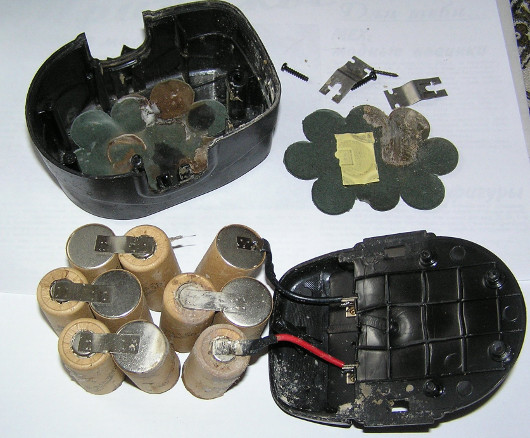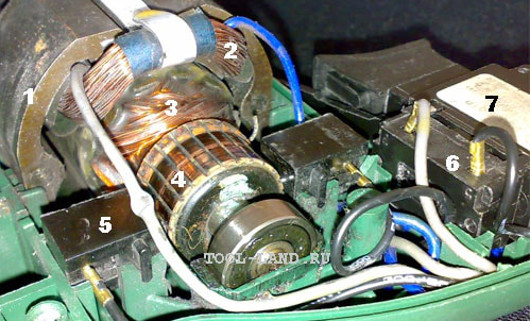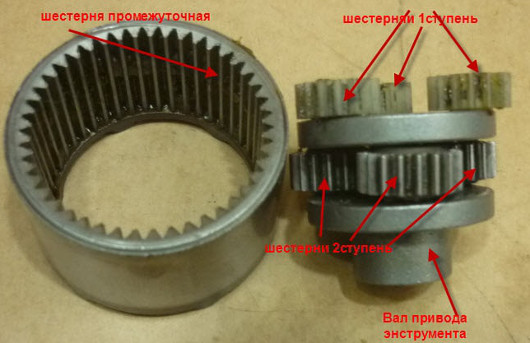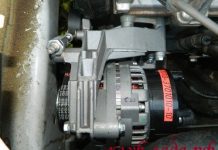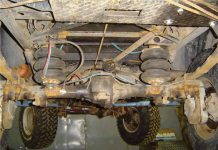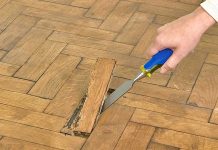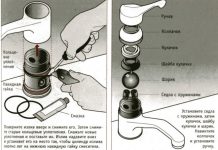In detail: do-it-yourself screwdriver repair progress regulator from a real master for the site my.housecope.com.
Furniture repair or installation is in full swing, and the screwdriver has stopped working. Consider the main causes of breakdowns and how to repair a screwdriver with your own hands (the video will also help us with this). To answer the question why the screwdriver does not work, and how to repair it, you need to have an idea about the device of the screwdriver, its main components, among which the following can be distinguished: a gearbox, a reversing device, an electric motor, a speed controller, and if the tool is autonomous - a battery (charging battery battery).
Moreover, both expensive and cheaper screwdrivers basically have a similar device, which differs from each other in the presence of certain advanced options. From here, we can highlight the main reasons why a screwdriver does not work, which almost all models suffer to one degree or another:
The first thing you need to pay attention to is the serviceability of the battery or the breakdown of the electrical cable from the mains (mains screwdriver).
Failure of the start button of the tool.
Engine speed not regulated or poorly regulated.
The impossibility of reverse switching.
Chuck runout.
The electric motor does not rotate.
Everyone understands that, regardless of the "steepness" of the perforator, without an energy source, its operation is impossible. Therefore, first of all, you need to check the health of the battery if your rotary hammer is mobile and does not depend on the power source. The main reason for the inoperability of the battery is its discharge or long-term operation. The second reason is eliminated by a complete replacement of the battery, and the first by simple recharging using the rectifier that comes with the sale of the tool.
Video (click to play).
Screwdriver battery disassembled
As a rule, two batteries are included in the same kit: one is in use, that is, in operation, and the other is being recharged. In the event of a charger failure, it would be more rational to replace it with a new one, unless, of course, you are an expert in radio electronics.
If you are the owner of a corded screwdriver, first of all, if the engine is not rotating, check the entire chain of the electric drive: the socket, the cable plug and the cable itself. Believe me, it often happens that the socket fails (the contacts burn), the cable plug may fail to work for the same reasons, and the cable itself may be damaged as a result of careless handling.
As a result of long-term operation of the tool, as well as the conditions in which it has to be used, there are often cases when the start button of the screwdriver fails - this is also one of the reasons why the screwdriver does not work. The problem is solved by purchasing a new trigger mechanism in the store and replacing it with an old, faulty one.
Start button (red) screwdriver
It is not difficult to get to the failed start button: you need to unscrew all the screws connecting the two halves of the tool body with a Phillips screwdriver. Next, using an electric soldering iron, disconnect the button wires from the electric motor, disconnect the terminals connecting the button to the battery or mains power cable and remove the problem from the case. We insert a new button in its place, do the connection process in reverse order and check the operation of the new part by connecting it to the battery or power cable.
Steps for disassembling the screwdriver button
Sometimes it is impossible to purchase a new start button in stores and you have to restore it yourself. However, we will not describe this entire process in detail for two reasons: firstly, the Internet is full of articles on this topic, and secondly, do-it-yourself repair of the start button is not the topic of our article. Therefore, we will move on.
The lack of adjustment of the screwdriver's engine speed significantly reduces the convenience when working with the tool, and also makes it impossible to produce high-quality work. The regulator is located in close proximity to the start button or is made as one piece with it, however, the speed regulator transistor is attached to the electric motor where it is cooled through the radiator grilles.
Location of the motor speed controller (7)
As practice shows, in the event of a similar problem, it would be more correct to replace the speed controller completely with a new one. Luckily they are available and are relatively inexpensive. All attempts to repair it led to the same conclusion, unless, of course, you are an electrical engineer.
The screwdriver's reversing switch plays an important role in the work of screwing in self-tapping screws, as well as their extraction in cases of need. The electric motor reverse circuit is located in the same housing as the speed controller, and the speed redirection switch button itself is located in a convenient place on the handle.
Start and reverse button side by side
Switching is carried out by changing the polarity on the terminals by moving the reverse button. Repair of the entire reverse circuit, including a PWM generator located on the board, comes down to cleaning the switch contacts and replacing the reverse circuit with a new one.
The beating of the screwdriver chuck indicates that there are problems in the health of the tool gearbox, which is located immediately behind the electric motor. This is another reason why a full blown screwdriver does not work.
Details of the planetary gearbox of the screwdriver
The output shaft of this gearbox is the place where the chuck is attached, so if we talk about the runout of the chuck itself, you need to keep in mind the runout of the gearbox shaft. The reasons for this may be the following:
a) the curvature of the gearbox shaft;
b) wear of the gears of the reducer;
c) failure of the thrust bearing of the gearbox shaft;
d) maximum wear of the pins on which the satellites of the planetary gear are mounted.
All of the above parts are of factory origin and are not subject to this repair. The problem of the beating of the screwdriver chuck in this case is solved by replacing the gearbox parts with new ones.
Malfunctions of the electric motor of a screwdriver are not much different from similar problems of a grinder, drill and other power tools. The first thing that can be the reason why the screwdriver does not work is the wear of the motor brushes, which can be easily replaced with new ones that are not very expensive. The second reason is the failure of the armature winding or motor stator.
The appearance of the electric motor of the screwdriver
Most often, an interturn circuit occurs due to a violation of the insulation of the winding wires. A short circuit can occur due to overheating of the electric motor from, so to speak, overwork, that is, you need to let the tool cool down in time, let it “rest”.
By the way, overheating of the screwdriver can lead to leakage of lubricant from the gearbox, which will lead to the failure of its main parts, which were mentioned above.
Another problem can be observed in the armature of the electric motor: pollution or oiling of the collector, which transmits electricity to the motor from the brushes.
Screwdriver motor brushes and commutator
The collector can be repaired at home by washing and cleaning it with fine sandpaper. But the stator and armature windings will have to be restored in a specialized workshop or the engine will be completely replaced with a new one.
In conclusion, I would like to note that a screwdriver will work for a long time and with high quality if it is treated with care, without showing "fanaticism" during its operation.
VIDEO VIDEO
A screwdriver is a tool often used in the professional field for repair and construction work, as well as in everyday life. Like any electromechanical device, screwdrivers are prone to malfunction. This device is not a complex device, and in the event of a problem, you can repair the main malfunctions of a screwdriver with your own hands.
The figure below shows the internal structure of the battery device.
In screwdrivers, both collector electric motors and brushless motors (they do not have electric brushes) can be installed.
If your screwdriver is broken, then the malfunctions of this device may be as follows.
All malfunctions, except for the electrical plug, can only be eliminated after disassembling the device.
To disassemble the device, follow these steps:
disconnect the battery pack from the body of the device;
unscrew all fasteners holding the 2 halves of the device together;
remove the upper part of the case;
remove all contents from the body of the device;
carefully disconnect the start button from the housing without damaging the wires connecting it to the engine;
remove the speed switch;
disconnect the motor, gearbox, coupling and cartridge by unscrewing 4 screws;
To unscrew the cartridge, you need unscrew the screw , which can be seen inside the mechanism with the cams open. Unscrew the screw clockwise, since it has a left-hand thread. After that, the chuck must be unscrewed from the gearbox shaft by turning it to the left (right-hand thread).
If you have a battery-powered device, then the first step is to check the batteries in the battery pack by disassembling it. There are collapsible and non-collapsible blocks. In the second case, you will need to carefully insert a screwdriver into the place where the walls of the block are glued together and, slowly, separate them.
Next, it is necessary measure voltage on all banks. The voltage rating is indicated on the case of each battery. The voltage should be slightly lower than the specified, but the same on serviceable batteries. Faulty batteries will differ significantly from the rest in terms of voltage output - they will need to be replaced. New batteries can be purchased online.
It is important to solder them correctly, that is, in series: the plus of one battery is connected to the minus of the other, and the plus of the second to the minus of the next, etc.
If you are the owner corded screwdriver , then the verification algorithm is somewhat different. First, you need to unwind the body of the device and remove one half of it. Take the tester and “ring” the power cord for a break. In the case of a working cord, you need to check the start button. Check with the button pressed if there is a circuit on its output contacts. If the button is defective, it will need to be replaced or repaired. How to do this will be discussed next. With a working button, the problem may lie in the electric brushes or the motor.
Below is a wiring diagram of a cordless screwdriver.
It can be seen from the diagram that 2 wires from the battery fit on the button, and 2 wires go to the engine from it. Also, 3 wires from the transistor responsible for speed control are connected to the button. To understand the device of the screwdriver button, it must be disassembled. All wires going to this part can not be soldered. They will not interfere with disassembly.
Remove push mechanism (red) from your seat.Do this with gentle twisting motions while pulling the part in the opposite direction of the button, making sure that the jokes do not break.
Next, remove button cover . In the places indicated by the arrows in the figure, use a knife and a screwdriver to pry and push out the latches, and then remove the cover.
When you remove the cover, you will see reverse compartment . But the button mechanism will still be unavailable. Using a soldering iron, separate the 2 elements (indicated by an arrow in the following figure).
Carefully pull out element number 1, then remove the cover that closes the compartment with the mechanism for turning on the device.
While holding the return spring, remove the mechanism from the housing.
In a faulty button, you will see erased contact pads.
contact pads wear out quickly due to the poor quality of the metal. Fine metal dust from worn contacts accumulates between them and closes the pads. As a result, spontaneous start of the device occurs.
Use cotton wool soaked in alcohol to remove metal dust. If this fails, you can scrape it off with a knife. After these steps, the spontaneous start of the device will stop.
If the speed controller does not work, then the transistor has burned out, which must be replaced.
To check the condition of the brushes, disassemble the engine , by bending the “antennae” located at the end of the case.
Next, with light hammer blows on the motor shaft, knock the rotor out of the housing.
In this case, the cover in which the electric brushes are located will first be removed.
The next photo shows that the collector has black color . This means that it will be contaminated with dust from the brushes. As a result of contamination of the collector, as well as the grooves between its plates, the engine power drops and the brushes spark. It is necessary to wipe the collector with cotton soaked in alcohol and clean the grooves with a needle.
The following photo shows what a clean collector looks like.
If the brushes are worn out, they will need to be replaced. For some models of screwdrivers it is difficult to find on sale original brushes . But you can find brushes that are the right size, then trim them on the grinder and connect (solder) to the brush holders.
Sometimes, to replace the brushes, you will need to cut a groove into them. It depends on how they are attached.
To better understand how the brushes are replaced, you can use the following video.
The motor brake is a device that stops the rotation of the armature when the start button is released. In screwdrivers, this function is implemented by closing the plus and minus of the motor when the button is released. As a result, there is a large self-induction, and there is spindle lock (with a lot of sparking from under the brushes). If the engine braking does not work, then the control transistor or start button will need to be replaced.
Mechanical failures of a screwdriver include malfunctions of the ratchet, gearbox and chuck of the apparatus.
If the ratchet on the screwdriver does not work, then you will need to disconnect it from the gearbox for troubleshooting. Sometimes special rods are installed in the coupling, which regulate the force, and in some devices, instead of rods, 2 balls are installed in each hole. They are pressed by a spring, which, when the adjusting ring is twisted, presses on the balls.
In most cases, the repair of a screwdriver ratchet consists in cleaning its components from contamination and applying new lubricant.
If unusual noises are heard in the gearbox, or the rotation of the spindle is jerky, with slippage, then the cause may be the failed gears of the mechanism, worn teeth on its body.
Gears most often break if they are made of plastic (used in cheap devices). If this happens, then they must be replaced.
In the next photo you can see the gear unit.
The reason that the spindle does not rotate when the engine is running may be the wear of the plastic teeth inside the gearbox housing.
To restore the mechanism to working capacity, it is necessary to disassemble the gearbox (it is better to photograph the disassembly process) and screw in place of the worn teeth small bolt , ground down to the required size. The place where you will install the bolt must be punched. It should be strictly opposite the plastic tooth located on the inside of the case.
Make such markings on the back of the case, opposite the first.
Next, drill holes in the marked places.
Screw the bolts of the required length into these holes, after grinding them so that they are flush with the other plastic teeth. After adjusting the bolts, the gearbox can be assembled with the required amount of lubricant applied to the gears. On this, the repair of the screwdriver gearbox can be considered complete.
To start repairing this unit, you must first remove the chuck from the screwdriver . To do this, complete disassembly of the screwdriver is not required. How to unscrew the keyless chuck was described above.
Common chuck malfunctions include incomplete exit of one of the cams, as shown in the following photo.
The cause of the malfunction may be worked thread on the nut clamping the cams, or worn teeth on the cams themselves. To verify this, you will need to disassemble the cartridge.
Disassembly and repair of the screwdriver chuck is done as follows.
It is necessary to hit with a hammer on the part protruding in its center. In order not to deform this part, you can lay a small piece of wood.
Separating the upper part will not be enough, and further disassembly of the cartridge will be required. To do this, lightly clamp the bolt into the cams and hit it with a hammer.
When the inner part of the cartridge falls out, its analysis is considered complete. You will see nut consisting of 2 halves . Most often, malfunctions in the cartridge occur due to this part. The thread on it wears out and the cams slip when twisting. Therefore, there is an incorrect centering of the latter.
Also, the thread can be worked on the cams, which, like the nut, must be replaced. But if you do not find the necessary parts to change them, then you will need complete cartridge replacement . When assembling the cartridge, the cams must be installed at the same level, in a compressed state, after which a nut consisting of 2 halves is put on, and after that the whole structure is placed in the body. When the problem is fixed, you can assemble the screwdriver.
In practice, finding spare parts for a cartridge is troublesome. It is easier to buy a new chuck, since its price is not so high, within 300 rubles.
VIDEO
A screwdriver is a mobile tool that makes it easier to work with fasteners and threaded connections. Until recently, cordless screwdrivers could only be found in the arsenal of professionals, but with the advent of inexpensive household models on the wide market, their popularity has increased dramatically.
Unlike expensive professional tools, budget counterparts have a smaller resource, which is why they fail more often.
One of the weakest points of a household screwdriver is the start button and reverse switch. As practice shows, they break most often.
As a rule, it all starts with the fact that the soft start function stops working, then a stronger pull on the “trigger” is required to start the electric motor.
Over time, the tool completely ceases to respond to any manipulations. Often there is a problem of the opposite nature, when the motor starts to work spontaneously.
In some cases, to eliminate the defect, it is enough to disassemble the tool and clean it, although more often a complete screwdriver button replacement . In both the first and second cases, you can fix the problem with your own hands. About everything in order.
The screwdriver button is the main control element that performs several functions at once:
Turning on / turning on the tool;
Switching the direction of rotation;
Smooth start of the engine;
Turnover adjustment.
At the same time, each of the controls built into the button block cannot work correctly by itself. Except for the direction of rotation switch, which is often a separate function block.
The body in most cases consists of three conditional compartments in which the working units and mechanisms are located.
In the lower part of the case there is an on / off control unit and motor speed control.
The “trigger” of the soft start is located in the middle part (the deeper it is pressed in, the higher the rotation speed of the cartridge). The button, when pressed, slides in a special block along the guides, a variable resistor is responsible for adjusting the speed.
In the upper part there is a reverse button - a switch for the direction of rotation of the cartridge. The direction is changed by changing the polarity of the voltage applied to the switch.
This is approximately how all control units of screwdrivers of different brands are arranged. To get acquainted with the device of the button of a particular instrument model in more detail, we recommend that you study screwdriver button diagram (it is in the instructions).
To diagnose and repair a screwdriver, you will need the following tools:
As a result of the active use of any power tool, dirt inevitably accumulates inside its body.
Getting into the control unit, it prevents the full movement of the "trigger" and blocks it.
Therefore, before going to the store for a new block, you should try to clean the old one. The soot formed on the contacts should also be cleaned with fine sandpaper. If the button is non-separable, you will have to replace the entire unit.
Stages of diagnostics:
We disassemble the body of the instrument. To do this, disconnect the battery, unscrew all the screws (they can be hidden behind decorative trims that will have to be removed).
We check the health of the electric motor. To do this, we disconnect two power wires from the control unit and connect them to the battery contacts (the engine should start).
We disassemble the button of the screwdriver. To do this, press the plastic latches and separate the two parts of the button body.
We make a visual inspection of the state of the button for dirt and damage.
Next, you need to carefully assemble the screwdriver button, install it in place and test it.
VIDEO INSTRUCTION
VIDEO
If cleaning the control unit does not work, the entire button unit must be replaced.
Disassemble the screwdriver (the process is described above);
Install a new button in place of the old one;
Connect the motor to the button terminals (observance of polarity in this case is optional);
Assemble the screwdriver, carefully placing the wires in the housing.
It is very important to choose a button for a specific screwdriver model, because with all the external similarity and visual correspondence, the part may not fit into the grooves. As a rule, new buttons are sold complete with battery terminals and a transistor.
A screwdriver can be safely classified as a tool that quite often has to be used not only in everyday life, but also for working on construction sites. But, like any complex technical accessory, the product can break. How to repair a screwdriver yourself, we will consider in this text.
Equipment in the construction market, where screwdrivers occupy a separate place, is quite large. Many models have individual criteria, are characterized by assembly quality and cost. However, most models are characterized by the basic principles of operation and internal design.
The basic elements of any screwdriver include:
the presence of an electric motor;
planetary reductor;
adjustable functional button "Start";
reverse switch;
effort regulator;
power unit.
The electric motor is powered by a DC network, structurally represented by a cylindrical shape. Inside is an anchor with brushes and magnets. A feature of the electrical circuit of the motor suggests that the direction of the supply voltage flow will be directed to the brushes. When the supplied polarity is reversed, the motor reverses.
The planetary gearbox is an important element capable of converting the high-frequency vibrations of the electric motor shaft into low-frequency revolutions of the cartridge shaft. As a rule, these parts are made of wear-resistant plastic or metal. Many screwdrivers are equipped with 2 speed gearboxes. Switching to the first speed mode is necessary for working with self-tapping screws, and at the second speed it is possible to drill in a wood, plastic base or metal.
The "Start" key starts the device. It is able to control the number of revolutions, providing the ability to choose the optimal rotation speed for the cartridge shaft. Accordingly, a strong pressure will drive the engine at high speeds, and with a decrease in pressure, the power criterion will weaken.
The reverse switch is necessary for carrying out operations to change the rotational direction of the screwdriver motor. This functionality is convenient to use not only for tightening, but also for unscrewing screws.
Regarding the force regulator, we can say that it determines the speed of tightening the screws. The current models provide a 16-step adjustable gradation, which allows you to determine with maximum accuracy and convenience what puff speed is relevant when working with different materials.
The screwdriver is powered by batteries of overall size, where the power of the supply voltage (depending on the model device) can range from 9 to 18V.
VIDEO
the breakdown is related to the electronics of the device;
failure may be mechanical.
Understanding the objective causes of electrical breakdown, we can note its characteristic features:
the product stops responding to switching on;
the device has ceased to regulate speed;
reverse operation has failed.
Mechanical problems with a screwdriver include problems with wear of internal parts, for example, a characteristic ratchet of the mechanism is heard. As a rule, a faulty screwdriver will begin to make characteristic sounds, where, for example, bushings have worn out or a bearing has collapsed. Often this happens on a hammer instrument.
VIDEO
For example, if the tool stops turning on, then initially you need to check the health of the battery. If the breakdown does not disappear when the device is based on charging, then you will have to arm yourself with a multimeter and start scanning the device in search of the root cause. First of all, take a look at the voltage value indicated on the case of the device and compare it with the measurements on the battery. The data should roughly match. If the voltage is too low, then most likely the problem lies in the charger or battery pack.
For example, the charger can be checked with a multimeter by plugging it into the network and taking measurements at the terminals of the device at idle. It is important that the voltage criterion be somewhat higher than the nominal one. In a situation where there is no voltage, then, unambiguously, the culprit of the breakdown is the charging unit. Screwdrivers of the company Interskol "get sick" with this rather frequent problem. In general, to fix the defect, you will need specific knowledge in electronics or you will need to purchase a new unit.
If you find a battery problem, for example, with a Makita screwdriver, you can open this block with your own hands, where the power elements are located. As a result of the opening, it is necessary to examine the connecting wires and make sure that the soldering is of high quality. If no visible defects are found, then using a scanner, voltage measurements in each element should be made. The values should show 0.9 - 1V voltage power. If a block with a low voltage indicator is found in a row, then it must be replaced.
VIDEO
Quite often, problems with buttons are associated with poor contact at the terminals. You can simply clean the contacts with sandpaper and the problem will be solved. The main thing is that in the process of disassembling and assembling the device, do everything carefully, without losing parts.
Gearbox failure refers to one of the mechanical problems with a screwdriver. Some of the most common reduction block problems include:
physical curvature of the axis of the reduction shaft;
a clear defect in the working surface of the gears;
failure of the shaft support sleeve or the original bearing;
breakage of the pin where the satellites are fixed.
To correct these defects, it will be necessary to physically replace the defective parts, therefore, this type of repair should be entrusted to qualified specialists who are able to correctly and accurately diagnose the breakdown and eliminate it.
VIDEO
One of the most "running" tools of the home master is a screwdriver. But, like any product, it breaks. What to do in this case? In some types of work, an electric drill can save the situation, but only in some. You can take the tool to a service center and wait for it to be repaired. But this will require time and money, which will have to be paid for the repair of the instrument. But, as a rule, the third option is also available - repairing the Makita screwdriver, and the device of the screwdriver is not so complicated.
Let's look at the main symptoms of screwdriver malfunctions and how they can be fixed at home on your own.
Before proceeding directly to the malfunctions of this tool, it would be nice to briefly get acquainted with the device of the screwdriver and the purpose of its main components. Let's start with this. The photo below shows a disassembled screwdriver, based on it, we will consider the purpose of the parts.
We'll start with the start button.The button performs two functions: turning on the power supply circuit of the electric motor and its speed controller. When the button is pressed all the way, the engine power circuit is closed by the button contacts in a straight line, providing maximum power and speed. The speed controller is electronic, it consists of a PWM generator located on the board. Depending on the force of pressing the button, the contact located on the button moves along the board. The degree of the generated pulse per key depends on its location along the board; That is, the dependence is as follows: the stronger the user presses the button, the higher the pulse value on the transistor and the more it opens, thereby increasing the voltage on the electric motor.
Reversing the rotation of the motor is carried out by changing the polarity at the terminals. The polarity change is carried out with the help of changeover contacts, which are transferred by the user using the reverse handle.
Electric motor. In this tool, as a rule, single-phase DC collector motors are used. They are characterized by reliability, ease of production and maintenance. The design of such an engine is as follows: a housing on which magnets, an armature and brushes are located.
Reducer. Its purpose is to convert a high number of revolutions of the motor shaft into much lower revolutions of the chuck shaft. There are two types of gearboxes for screwdrivers: planetary and classic. The latter is very rarely used, so we will pay attention to the planetary type gearbox. The planetary gearbox consists of:
ring gear;
sun gear, which is fixed on the motor shaft;
satellites and carrier (their number depends on the number of steps, there are two and three step).
Without going into subtleties, consider the principle of operation of such a gearbox. The sun gear is driven by the armature shaft, in turn, its teeth drive the satellites, which transmit the rotation of the planet carrier. With a two-stage gearbox, the chuck shaft is connected to the second carrier, with a three-stage gearbox, to the third.
The force regulator is designed to regulate the force that is applied to the screw. As a rule, 16 adjustment positions are used. Thus, there is a wide range of screw tightening levels, which allows working with very fragile materials (drywall, etc.). Its principle of operation is well shown in the video below.
The chuck is attached to the gearbox output shaft and has three jaws that securely hold the part in the chuck.
VIDEO
Having considered the main elements of a screwdriver, let's move on to possible malfunctions and possible ways to repair an AEG screwdriver. And we'll start with the electrical part. The main signs of a malfunction of the electrical component of a screwdriver are:
the tool does not turn on;
no reverse mode switching;
no speed control.
The tool does not turn on. The first thing you should pay attention to when repairing a Skil screwdriver is the battery. If they put it on charge, and it didn’t help, then we arm ourselves with a multimeter and start troubleshooting. To begin with, we measure the voltage on the battery, it should more or less correspond to that indicated on the battery case. In case of undervoltage, it is necessary to determine the faulty element: battery or charger.
You can determine the health of the charger with a multimeter, for this we plug it into the network and measure the idle voltage at the terminals. It should be a couple of volts more than the nominal value indicated on the device. If there is no voltage, the charger is faulty. For such a repair of an Interskol screwdriver, knowledge of electronics will be required, otherwise it is easier to buy a new one.
If the problem is with the battery, then to repair the Makita screwdriver with your own hands, you need to open the block with the elements. After the unit has been disassembled, it is necessary to carefully examine all the junctions of the wires and check the quality of the soldering, if any has come off. In the case of the integrity of all connections, we take a multimeter and measure the voltage on each element. Each element should have at least 0.9 - 1V voltage. If an element with a lower voltage is found, it must be replaced. The main thing is that the capacity and type of the element correspond to the rest (i.e. if NiCd, then NiCd is also needed). You can learn more about battery repair from the article: “Do-it-yourself screwdriver battery repair”.
If the charging and battery are working, and the screwdriver does not turn on, it is necessary to disassemble the screwdriver. Two wires go from the battery terminals to the button, we take a multimeter and measure the voltage at the button input (the battery is inserted). If there is voltage at the input, then we take out the battery and use the crocodile clips to short the wires from the battery. We set the device to measure resistance in ohms. We press the button all the way and measure at the exit from the button. The device should show a resistance value tending to zero, if so, the button is working, the problem is either in the brushes or in other elements of the electric motor. If the tester shows a break, the button needs to be replaced or repaired. You can try to repair it yourself, as it often happens that there is no contact on the terminals due to burning, it will be enough to clean it with sandpaper and assemble it. The main thing when disassembling the button is not to rush and act carefully, otherwise all the details will scatter, and you will have to rack your brains for more than one hour - how to assemble.
Similar actions will need to be taken in the absence of a reverse. We put one probe of the device on the input wire of the button, the second, on the contact of the electric motor or the output of the button, as it is more convenient. Switch the reverse lever. If everything is in order, the device will fix a certain amount of resistance, if it is “silent”, the conductivity of the reverse contacts is broken. The procedure for disassembling and cleaning the contacts is similar to that described above, as well as when repairing a Caliber screwdriver.
The engine is running at maximum speed, but there is no speed control? The cause of the malfunction can be both in the button itself and in the regulating transistor.
If all circuits up to the electric motor are working, but the tool does not work, the malfunction may be related to the brushes. Ideally, brushes should be changed when they are worn to 40% of their original length. If the brushes are worn out, replace them with new ones; if the brushes are in order, there is a problem with the rest of the motor elements. To check the electric motor, it is necessary to disconnect the wires that come from the button. After the wires are disconnected, using a multimeter, we measure the resistance value at the wire fastening contacts. If the resistance value is small and tends to zero, most likely the winding has broken, either rewinding or a new motor is necessary.
You can check the integrity of the armature windings, since the armature can be bought and changed independently. To check the armature, it is necessary to measure the resistance on two adjacent collector plates, around the entire circumference. In this case, the normal value is "0". If during the check you find two adjacent plates with a value different from zero, the anchor needs to be repaired or replaced.
VIDEO
Signs of a malfunctioning mechanical part of a screwdriver may include the following:
during operation, the tool makes extraneous sounds that were not previously observed;
strong vibration of the tool and the fight of the chuck;
the screwdriver turns on, but its further work is impossible due to jamming.
The reasons for "extraneous" sounds during the operation of the tool may be wear of the bushings or armature bearing.To do this, it is necessary to disassemble the electric motor and examine it for the integrity of the bearing and the degree of wear of the bushing. The anchor should rotate easily, without friction and distortion. If necessary, these elements can be purchased at the store and replaced by yourself.
The most common gearbox failures are:
gear shaft distortion;
wear of the working surface of the gears;
wear of the bearing and / or bearing sleeve of the gearbox shaft;
a break in the pin on which the satellite is attached.
In all cases, it is necessary to replace the defective parts of the gearbox. All the described actions require attention and consistency in disassembling and assembling the screwdriver. Having shown these qualities, you will be able to independently repair the Interskol screwdriver with your own hands, or any other, and only in some cases resort to the help of a service center.
Video (click to play).
VIDEO

